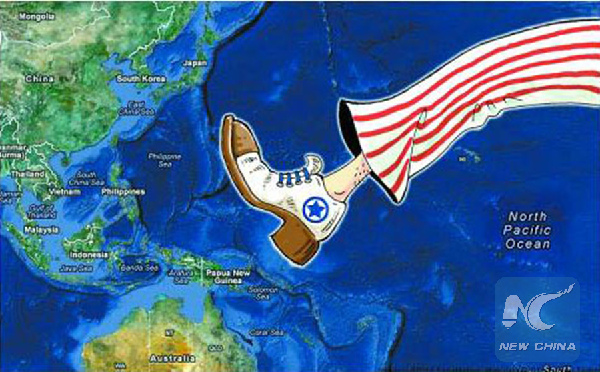Outsider countries should refrain from making waves in South China Sea
 0 Comment(s)
0 Comment(s) Print
Print E-mail Xinhua, March 9, 2016
E-mail Xinhua, March 9, 2016
 |
|
[Xinhua] |
The tranquil waters of the South China Sea have been stirred up lately as some outsider countries have been busy expanding their presence and flexing military muscles in the region.
Such dangerous and irresponsible activities would only put regional stability at risk, and it is advisable for some of the countries outside the South China Sea region to refrain from muddying the waters here and fishing for their own political benefits.
Media reports said Monday that Japan's maritime Self-Defense Forces plan to send a submarine and two warships to Subic Bay in the Philippines for a port call next month, and the warships will then proceed to Cam Ranh Bay in Vietnam.
It would be the first time in 15 years a Japanese submarine visits the Philippines, but it is apparently not the first time that Tokyo tries to make waves in the South China Sea by extending its military reach in the strategically crucial western Pacific.
Although Japan has no claims in the South China Sea, it has in recent years adopted a gradual approach to increase its intervention over the waters to confront China.
Seeking to ramp up its military presence in the region, Japan has held working-level discussions with some Asian countries over defense equipment cooperation. Meanwhile, Tokyo and Manila have entered negotiations so that Japan's ships and aircraft have access to Philippine military bases.
Recent reports also revealed that Japan intends to give three Beechcraft TC-90 King Air planes to the Philippines as gifts.
The TC-90 aircraft has a radius of action twice of those in the Philippine Navy and will be able to cover most of the Nansha islands. Manila will use the planes to carry out air patrol missions in the South China Sea.
Instead of making tangible efforts to improve relations with China, the Japanese administration is obviously more interested in deepening its strategic ties with nations mired in South China Sea disputes to contain its neighbor.
Such moves would only have a negative impact on the regional security situation as intervention, especially military involvement from outsider countries, is likely to lower the willingness of the countries in the region to solve longstanding disputes through dialogue and negotiation, thus increasing the likelihood they would opt for confrontation and resort to military force.
The already complex situation in the South China Sea requires sobriety and restraint, instead of arbitrary involvement with selfish motives, which would only stir up trouble, and eventually jeopardize regional stability and hurt the interests of all countries in the region.






Go to Forum >>0 Comment(s)